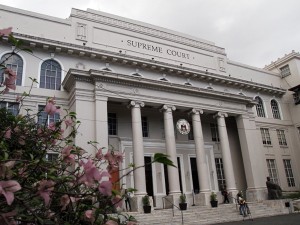SC upholds with finality Migrant Workers Act’s legality
MANILA, Philippines–The Supreme Court upheld with finality the legality of certain provisions of Republic Act 8042, or the Migrant Workers and Overseas Filipinos Act of 1995.
In a resolution made public Tuesday, the high court dismissed the partial reconsideration by the government which sought to reverse their December 17, 2012 decision.
“The Court Resolved to Deny with Finality the motion for partial reconsideration filed by the Office of the Solicitor General for the petitioners as the basic issues raised therein have been passed upon by this Court and no substantial arguments were presented to warrant the reversal of the questioned Decision,” the high court said.
In its December 2012 ruling, the high court, through Associate Justice Roberto Abad reversed the Manila regional trial court (RTC) decision declaring sections 6,7,9 and the last sentence of the second paragraph of Section 10 of RA 8042 as invalid.
Section 6 defines the crime of “illegal recruitment” and enumerates the acts constituting the same. Section 7 provides the penalties for prohibited acts. Section 9 allowed the filing of criminal actions arising from “illegal recruitment” before the RTC of the province or city where the offense was committed or where the offended party actually resides at the time of the commission of the offense.
Finally, the last sentence of the second paragraph of Section 10 holds the corporate directors, officers, and partners of recruitment and placement agencies jointly and solidarily liable for money claims and damages that may be adjudged against the agencies.
The high court found “illegal recruitment” as defined in Section 6 of RA 8042 clear and unambiguous.
In fixing uniform penalties, as stated in Section 7, for each of the enumerated acts under Section 6, the high court ruled that “Congress was within its prerogative to determine what individual acts are equally reprehensible” consistent with the State policy of according full protection to labor and deserving of the same penalties.
The Court also declared that there is nothing unconstitutional with Section 9 of RA 8042, which allows offended parties to file the criminal case in their place of residence in addition to the place where the crime is committed. It held that the fixing of an alternative venue for violations of Section 6 of RA 8042 that differs from the venues established by the Rules of Criminal Procedure is “consistent with the law’s declared policy of providing a criminal justice system that protects and serves the best interest of the victims of illegal recruitment.”
As to the last sentence of the second paragraph of Section 10, the high court noted that the “liability of corporate directors and officers is not automatic. To make them jointly and solidarily liable with their company, there must be a finding that they were remiss in directing the affairs of that company.”
